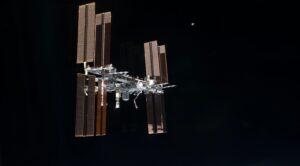NASA Inspector General skeptical of ISS commercialization plans

WASHINGTON — A new report by NASA’s Office of Inspector General raises doubts about the feasibility of NASA’s plans to transfer ISS operations to the private sector in 2025.
In a report published July 30, the office also warned that NASA’s research goals may not be completed by 2024 as expected, requiring additional time on the ISS or another facility in order to meet the agency’s deep space exploration requirements.
The report was skeptical of plans, announced in the agency’s fiscal year 2019 budget proposal in February and a transition report submitted to Congress in March, to end direct federal funding of ISS operations in 2025, transferring all or part of it to the private sector in a bid to save money and support the commercialization of low Earth orbit.
“Based on our audit work, we question the viability of NASA’s plans as outlined in its ISS Transition Report, particularly with regard to the feasibility of fostering increased commercial activity in low Earth orbit on the timetable proposed,” the report states.
The report adds that NASA’s transition report “includes several overly optimistic assumptions related to revenues and costs of operating a future private low Earth orbit platform that call into question the validity of the analysis.” For example, the report assumes cargo transportation at a cost of $20,000 a kilogram, while NASA’s current Commercial Resupply Services contracts with Northrop Grumman and SpaceX charge about three times as much.
The report also notes that the “scant” level of commercial activity on the ISS throughout the station’s history raises additional skepticism about the viability of a commercially operated station by the mid-2020s.
The report is not the first time the agency’s inspector general has raised doubts about NASA’s ISS commercialization plans. “We question whether a sufficient business case exists under which private companies can create a self-sustaining and profit-making business using the ISS independent of significant government funding,” Paul Martin, NASA’s inspector general, said at a May hearing by the Senate’s space subcommittee on the future of the ISS.
The report also noted that NASA may find it difficult to complete some its human health research and technology development projects by 2025. The agency said at least eight human health risks for future long-duration missions will need testing through 2024 or beyond, in some cases extending out through 2027. Several technology development efforts may also need one or two years of additional work on ISS.
As part of that research, the report endorsed the flight of more one-year missions, similar to the one flown by NASA astronaut Scott Kelly and Russian cosmonaut Mikhail Kornienko in 2015–2016. NASA researchers, the report stated, identified “as many as 11 human health risks would benefit from these additional one‐year missions because they would provide more data than standard 6‐month ISS missions on how spaceflight impacts the human body over extended periods of time.” NASA accepted a recommendation to study such additional one-year missions in a response included in the report.
One solution to both the commercialization concerns and the research needs would be to extend the ISS beyond the mid-2020s. Engineering analyses have concluded that the ISS can be operated safety through at least 2028, the report stated.
Any extension, though, would come at a price, namely the $3–4 billion a year that NASA currently spends on ISS operations that the agency had hoped to redirect towards exploration programs, such as missions to the moon and ultimately Mars. “As a result, NASA managers will face significant challenges operating the ISS under its current model while attempting to fund NASA’s other potential space exploration initiatives such as the Lunar Orbital Platform-Gateway, a lunar orbit/landing, and preparations for a crewed Mars mission,” the report concluded.
However, even if the ISS ended in 2025, the office argued that NASA would not be able to apply that full funding to other programs. “Specifically, even with termination of most Station activities, NASA would still be required to pay for any remaining Agency activities in low Earth orbit including any crew and cargo transportation services – projected to cost $1.8 billion in 2024,” it stated.
The report comes as a Senate committee prepares to take up a bill that would extend ISS operations. The Space Frontier Act, S. 3277, includes language amending previous NASA authorization acts to extend the life of the ISS from 2024 to 2030. The bill, introduced last week by Sens. Ted Cruz (R-Texas), Ed Markey (D-Mass.) and Bill Nelson (D-Fla.), will be marked up by the Senate Commerce Committee Aug. 1.
from SpaceNews.com https://ift.tt/2KdCDy7
Comments
Post a Comment